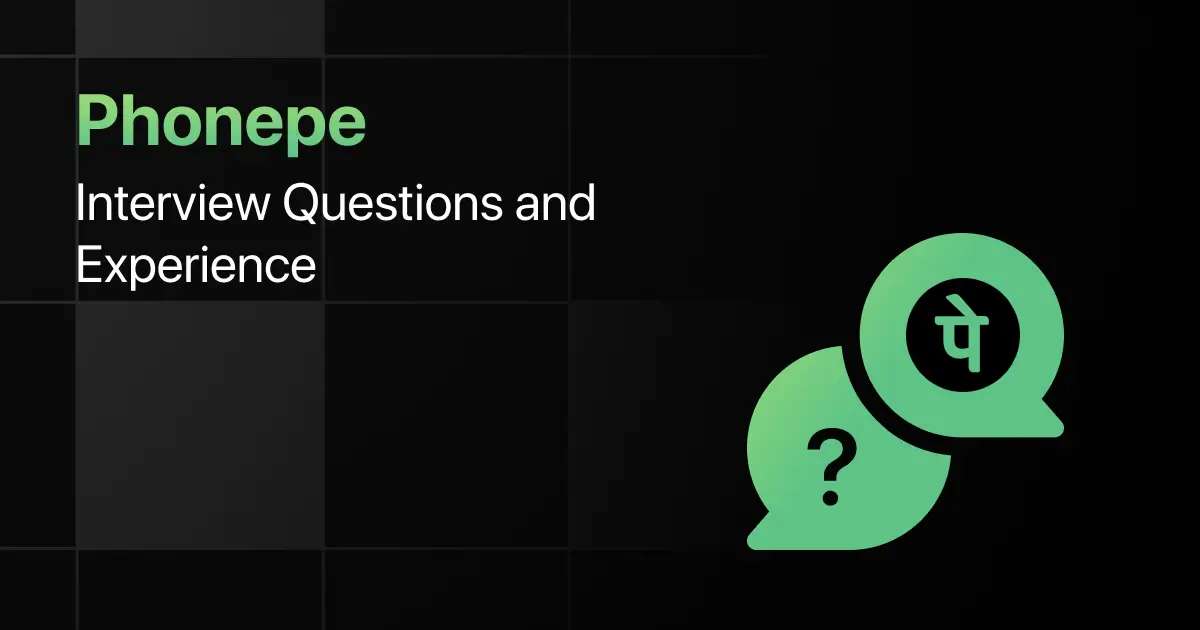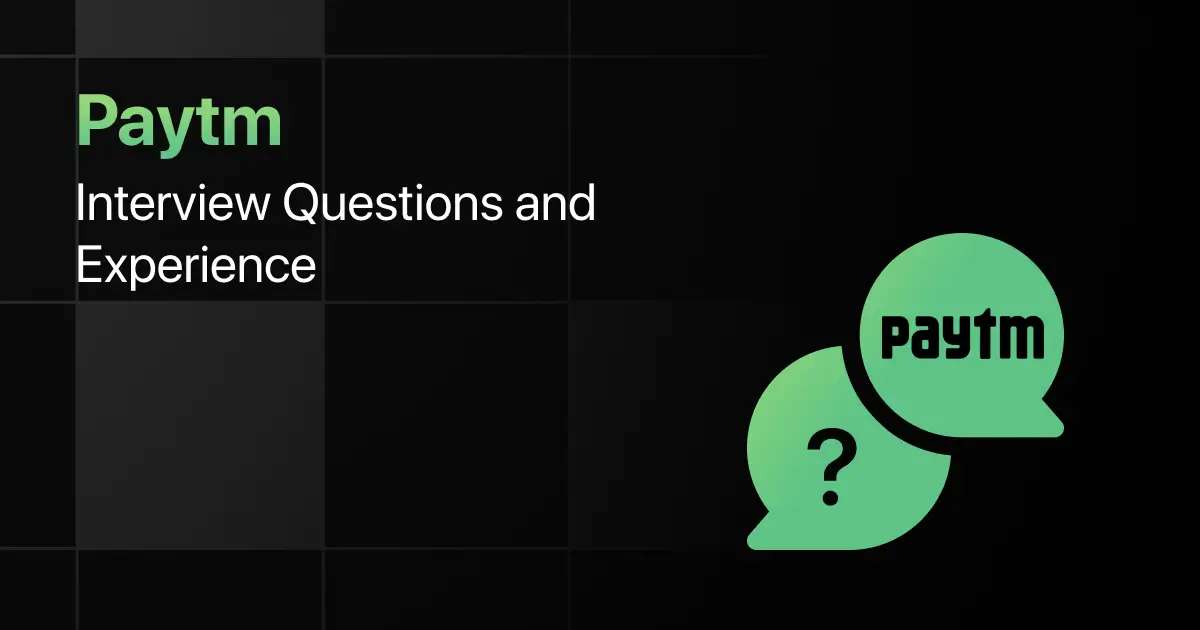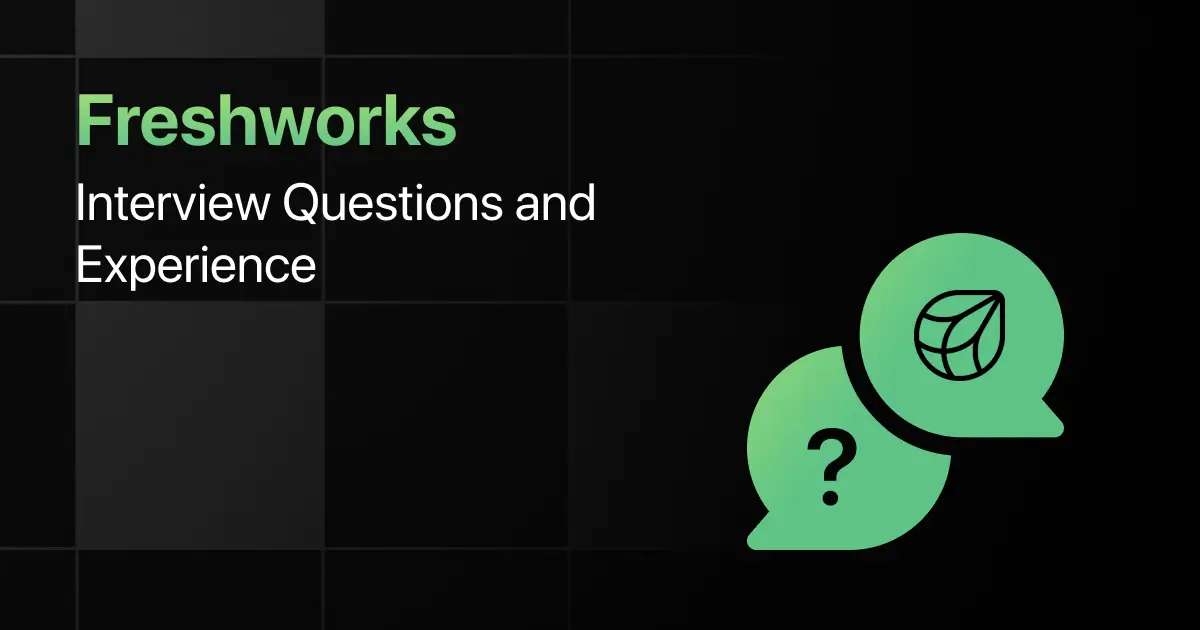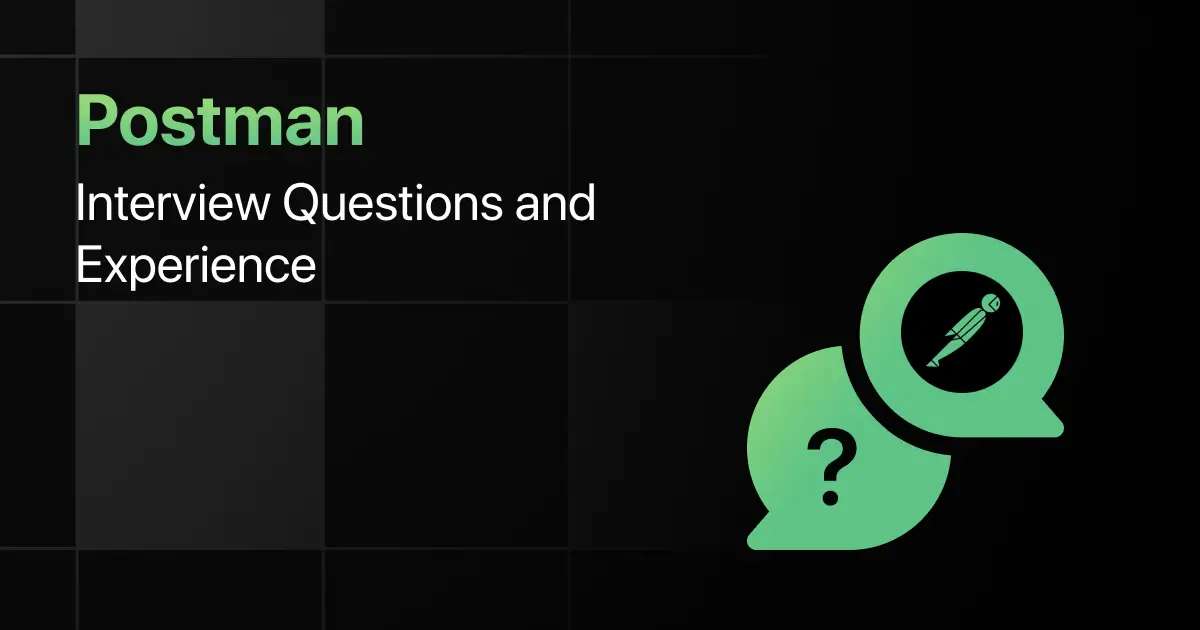PhonePe Interview Questions and Experience

Have you ever thought about what it takes to work at PhonePe, one of India’s leading fintech companies? With millions of users relying on its digital payments platform daily, PhonePe is known for its strong engineering culture and fast-paced environment.
The interview process at PhonePe goes beyond coding. It tests your ability to solve real-world problems, design scalable systems, and align with a high-performance culture. Candidates are also assessed on communication and adaptability, which are critical in a dynamic fintech setup.
In this blog, we’ll explore the PhonePe hiring process, top interview questions, real candidate experiences, preparation tips, and FAQs to help you prepare effectively.
PhonePe Hiring Process – Overview
Here’s a quick overview of PhonePe’s hiring process:
| Category | Details |
|---|---|
| Eligibility | Open to both freshers and experienced candidates. Preferred degrees include B.E/B.Tech, M.Tech, MCA, or equivalent in Computer Science, IT, or related fields. |
| Rounds | Typically 4–5 rounds, including Online Assessment (OA), Technical Interviews (DSA, System Design, Domain Knowledge), Managerial/Behavioral Interview, and HR Round. |
| Job Roles Offered | Software Development Engineer (SDE-1, SDE-2), Data Engineer, Backend Developer, Mobile Engineer (Android/iOS), and Product Analyst roles. |
| Salary Range | Freshers: ₹10 – 15 LPA (SDE/Analyst roles); Experienced: ₹20 – 40 LPA depending on role and seniority (based on AmbitionBox & Glassdoor). |
| Apply Link | Apply Now |
Top PhonePe Interview Questions with Answers
PhonePe interviews are structured to test problem-solving, technical fundamentals, role-specific expertise, and cultural fit. Below are the types of questions often asked in PhonePe interviews.
1. Technical Questions
- What is the difference between SQL and NoSQL databases, and when would you use each?
SQL databases are relational and structured, ideal for transactions. NoSQL databases handle unstructured, large-scale data and work best for scalability and flexibility. - Explain ACID properties in databases with an example.
ACID ensures reliable transactions: Atomicity, Consistency, Isolation, Durability. For example, in banking, transferring money must debit and credit simultaneously. - What is the CAP theorem in distributed systems?
CAP theorem states that a distributed system can only guarantee two out of three: Consistency, Availability, and Partition Tolerance. - How do microservices differ from monolithic architecture?
Microservices break systems into independent services for scalability and agility. Monolithic combines everything into one, making scaling and debugging harder. - What are indexes in a database, and when should you avoid them?
Indexes speed up queries but increase write costs. Avoid them in write-heavy systems or when the dataset is very small. - What is eventual consistency in distributed systems?
It means all replicas in a distributed system will become consistent eventually, though not immediately, ensuring high availability in large-scale systems. - Explain load balancing and its importance in large-scale systems.
Load balancing distributes traffic across servers to prevent overload, improve availability, and provide fault tolerance in high-demand systems like PhonePe. - What’s the difference between strong consistency and weak consistency?
Strong consistency ensures immediate data updates across replicas. Weak consistency allows temporary mismatches for higher system availability. - How does caching improve application performance?
Caching stores frequently accessed data closer to users, reducing latency and database load, essential in payment applications with high traffic. - What is idempotency in APIs, and why is it important in fintech apps?
Idempotency ensures repeating the same request produces the same result, avoiding duplicate charges in financial transactions. - How do you secure sensitive data in a fintech application?
Through encryption (AES, RSA), tokenization, secure authentication, and compliance with standards like PCI-DSS. - What’s the difference between horizontal and vertical scaling?
Horizontal scaling adds more machines; vertical scaling increases a single machine’s resources. Fintech apps often prefer horizontal for better fault tolerance. - Explain the difference between optimistic and pessimistic locking in databases.
Optimistic assumes minimal conflicts and checks before commit. Pessimistic locks records during transactions, ensuring consistency but reducing concurrency. - What is a message queue, and why is it useful?
Message queues decouple services, allowing asynchronous communication, fault tolerance, and scaling in distributed systems. - What are REST and gRPC, and when would you choose one over the other?
REST uses HTTP with JSON, widely adopted but slower. gRPC uses HTTP/2 with Protocol Buffers, faster and better for service-to-service communication.
2. Role-Based Questions
For Freshers (SDE-1)
- Why do you want to work at PhonePe as a fresher?
PhonePe offers large-scale engineering challenges and a fast-paced learning environment, making it an ideal platform to grow as an engineer. - How do you prioritize learning new technologies?
I focus on fundamentals first, then explore tools relevant to my role. I also balance between project needs and career growth. - What is your approach to debugging an application?
I start by reproducing the bug, analyze logs, isolate the issue, and apply fixes systematically, ensuring I don’t break existing functionality. - How do you prepare for coding interviews?
By consistently solving problems on platforms like LeetCode, reviewing CS fundamentals, and practicing mock interviews for real-time problem-solving.
For Data Analysts
- How do you clean and preprocess raw data for analysis?
I handle missing values, remove duplicates, normalize formats, and apply transformations for consistency before running any analysis. - Explain the difference between OLTP and OLAP databases.
OLTP supports transaction-heavy systems like PhonePe. OLAP is used for analytical queries and reporting. - What visualization would you use to show payment trends over time?
A time series line chart is ideal to track daily, weekly, or monthly payment trends across users. - How would you measure the success of a new feature in PhonePe?
By defining KPIs like user adoption rate, transaction volume, and retention rate, and tracking them over time.
For Backend Developers
- How would you design a payment gateway system?
Ensure secure authentication, transaction validation, idempotency, and logging. Use load balancers, distributed databases, and strong encryption for safety. - What is the role of API gateways in microservices?
API gateways manage routing, security, rate limiting, and monitoring between clients and backend services. - How would you handle high transaction concurrency in PhonePe?
Use optimistic locking, distributed databases, caching, and queueing systems to manage concurrency safely. - Explain how you would log and monitor failed transactions.
Through centralized logging tools like ELK/Prometheus and real-time alerts, enabling quick identification and resolution of issues.
For Managers
- How do you handle a team under tight deadlines?
I break tasks into smaller milestones, delegate effectively, and maintain open communication to ensure timely delivery. - How do you resolve conflicts between team members?
I encourage open discussions, mediate disagreements, and focus on solutions that align with business goals and fairness. - How do you measure team performance?
Using KPIs like delivery timelines, code quality, peer reviews, and project impact rather than just hours worked. - How do you motivate your team during setbacks?
By acknowledging challenges, appreciating efforts, and setting realistic recovery goals with continuous support.
3. Behavioral Questions
- Tell me about a time when you missed a deadline. How did you handle it?
I communicated early, explained blockers, and proposed a revised timeline. This transparency helped maintain trust. - Describe a situation where you had to work with limited resources.
I prioritized critical features, reused existing tools, and optimized workflows to achieve results within constraints. - How do you handle feedback from a senior that you disagree with?
I respectfully share my perspective with supporting data, but adapt to their approach if it aligns with overall goals. - Tell me about a challenging project you worked on.
I worked on a project with strict deadlines and unclear requirements, managed it through iterative planning and active stakeholder communication. - How do you manage stress during back-to-back interviews or deadlines?
By organizing tasks, taking short breaks, and focusing on one step at a time to maintain clarity and performance. - Give an example of when you showed leadership in a team project.
I took initiative to assign tasks, facilitated regular updates, and ensured collaboration that helped us complete the project on time. - How do you collaborate with cross-functional teams?
I maintain clear communication, set shared goals, and respect team expertise to align efforts effectively. - Describe a time when you had to learn a new skill quickly.
I once had to learn Kubernetes for a project, so I followed tutorials, experimented with examples, and applied it to deliver successfully.
PhonePe Interview Experiences
1. PhonePe SDE role Interview Experience (Fresher)
Here is the interview experience of Kunal Raut, who appeared for the PhonePe SDE role through an on-campus opportunity in 2022.
Candidate Background:
Kunal was a final-year student at PICT Pune with prior internship experience at HackerEarth and Vicevio. He was passionate about DSA and app development.
Interview Process They Faced:
The process had 3 stages — an online assessment on DoSelect, two technical interview rounds, and a final HR discussion.
Questions Asked:
- Online assessment: 4 coding problems on matrix paths, array frequency optimization, game theory, and tree-based DP.
- Technical Round 1: Missing number in sorted array, maximizing sum by picking prefix/suffix elements, and range queries on digits in numbers.
- Technical Round 2: Spread of infection in a binary tree, evaluating expressions with brackets, and system design basics.
- HR Round: Resume-based questions, internship experiences, and system design for a farmer app with features like downloads, storage, and engagement.
Outcome & Difficulty Level:
Kunal cleared all rounds and received the offer. He described the difficulty as medium–hard, with more emphasis on explaining approaches clearly than just solving problems.
2. Java Developer role Interview Experience (Experienced)
Here is the interview experience of Pudari Madhavi, who interviewed for the Java Developer role at PhonePe in 2025.
Candidate Background:
Madhavi had industry experience in backend development, with a strong focus on Java, concurrency, and distributed systems. They aimed to join PhonePe to work on high-scale payment systems.
Interview Process They Faced:
The process included 4 stages — online coding assessment, a Java-focused technical round, a system design interview, and a cultural fit/HR round.
Questions Asked:
- Online assessment: Top API endpoints using HashMap + Min Heap, string rotation check, and graph traversal to count islands.
- Core Java Round: Internals of HashMap, synchronized vs ConcurrentHashMap, garbage collection, JVM model, and LRU cache implementation with thread-safety discussion.
- System Design: Designed a simplified UPI payment system with idempotency, ACID transactions, concurrency control, and scaling to 1B daily requests.
- HR Round: Behavioral questions on production issues, unrealistic deadlines, and team conflicts, tested for ownership and communication.
Outcome & Difficulty Level:
Madhavi successfully cleared the process and received the offer. They described it as highly challenging, especially in Java depth and system design, but rewarding in the end.
Preparation Tips for PhonePe Interviews
Preparing for a PhonePe interview requires strong fundamentals, problem-solving ability, and the confidence to discuss your projects in detail. Here are some tips to guide you.
- Master Fundamentals: Revise core CS subjects such as DBMS, OOPs, operating systems, and computer networks. These topics are frequently tested in technical rounds.
- Practice DSA: Focus on arrays, strings, graphs, and dynamic programming. Consistent practice on LeetCode or HackerRank builds speed and accuracy.
- Understand System Design: Even for junior roles, basic low-level design questions are common. For senior roles, prepare for high-level design and scalability.
- Focus on Projects: Be ready to explain your projects in-depth, including tech stack choices, architecture, challenges, and impact.
- Be Role-Specific: If applying for analyst, backend, or product roles, tailor your preparation to those domains along with general problem-solving.
- Prepare STAR Stories: Have 4–5 STAR (Situation, Task, Action, Result) stories ready to answer behavioral questions confidently and clearly.
Final Words
PhonePe’s interviews are designed to test both technical depth and cultural fit. With solid practice in DSA, design, and communication skills, you can stand out and increase your chances of success.
Explore More for
- Amazon
- Salesforce
- Oracle
- Microsoft
- IBM
- Adobe
- Flipkart
- Apple
- Uber
- Meesho
- Zomato
- Swiggy
- Zoho
- Postman
- Freshworks
- Paytm
- Darwinbox
FAQs
PhonePe interview questions commonly cover DSA, system design, databases, microservices, API design, fintech security practices, and behavioral problem-solving scenarios.
For freshers, PhonePe interview questions are moderately tough, with more focus on DSA, core CS fundamentals, and a clear explanation of projects.
The PhonePe interview process generally takes 2–4 weeks, depending on the role, number of rounds, and recruiter or panel availability.
Candidates should focus on DSA, system design basics, databases, APIs, and backend technologies like Java, Python, or Node.js, depending on the role.
Common mistakes include skipping edge cases, weak explanation of projects, lack of fintech domain awareness, and not thinking out loud during problem-solving.
The PhonePe interview process typically has 4–5 rounds, including online assessment, technical rounds, managerial/behavioral discussion, and HR.
Yes, freshers are tested on CS fundamentals and coding, while experienced candidates face discussions on system design, scalability, and leadership.
The best way to prepare for PhonePe interviews is through consistent DSA practice, studying system design, and utilizing resources like PlacementPreparation.io.
Related Posts


Paytm Interview Questions and Experience
Preparing for a Paytm interview requires a clear understanding of the company’s hiring process, the type of questions asked, and …
Warning: Undefined variable $post_id in /var/www/wordpress/wp-content/themes/placementpreparation/template-parts/popup-zenlite.php on line 1050








